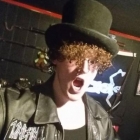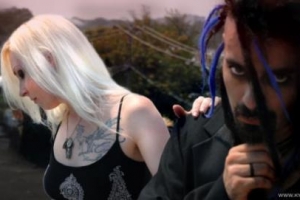Already reviewing their recent album "When The Wolves Return", I was able to talk to both Steve and Donna of Ego Likeness, pairing together history, peronsal projects, and information on their latest release.
You both have a long, long history together, with Ego Likeness being alive for sixteen years and your personal relationship for eighteen years. When was it that you two first met? And how did you get along when getting to know each other?
Donna - "We met at a club in 1997 or so. It was a weird and fast courtship. I won't say much more than that, haha!"
Steven - "True story, before we met, I would walk by her and she would tell her friends, 'I'm going to marry that guy.'"
And, when was it that you both decided that Ego Likeness would become a project? More importantly, when did you decide to form it into a full time project?
Eventually the other project withered away, and we were left with Ego. We established early on with our first full length, 'Dragonfly', that we weren't going to limit ourselves to any one style or genera. I would always tell people we were trying to fuse Skinny Puppy and Fleetwood Mac."
You both juggle multiple personal and collaborative projects on a near constant basis, always working with hardly ever any down time. Has it come easier over the years to keep up with all this work, or do you find it overbearing at times?
Steven - "The trick is maintaining perspective. In the end, our job description is: make stuff, then drive around the country, and show it off to our friends. When you look at it like that, you feel like a bit of an asshole when you complain. We are so lucky to live in a time where we have access to the technology to do what we do. In 1992ish, I had a band and we spent 5K just to put out a six song demo on cassette. Now, you spend a fraction of that on a good computer, and some gear, and you can do it all yourself. Of course, you also have to be willing to invest the time and energy it takes to learn how to use that stuff.
I seem to have wandered off topic, to answer the question, yeah, sure it's hard, but so what? We have both spent our lives learning to do what we do, Donna went to school for piano from the age of five and later, opera, and I was showing art in galleries at sixteen, it's the only life we know. I can't even imagine the amount of work it takes raising a kid, or living in the corporate world. All of the hard work has paid off in more things to work hard for, and hopefully that will never change."
Steven, one of your latest projects would happen to be Stoneburner which came to life in 2012. I find the tribal-electro sounds to be pretty wicked; when and how did you really come up with this idea?
Now, another question I have for the both of you is that with all your side projects do you ever hear an overlap of sound from one project unto the next? For example, does your work in Ego Likeness ever seep into projects such as Stoneburner?
But in the end, I think that all of the projects, Ego Likeness, Stoneburner, ::Hopeful Machines:: all sound different enough to warrant their own identities."
Now, let's talk about your latest album that's soon to come out, "When The Wolves Return". How do you think this album is different from the rest of your discography?
I understand that most, if not all of your albums come with a loose concept or story. Is there a fable wrapped up inside "When The Wolves Return"? And, if so, could you tell us the tale in a brief manner?
Musically speaking, the instrumentation, both electronic and not, was on spot. What gear did you use to record "When The Wolves Return" and did you have any difficulty putting the tracks together?
As to putting the tracks together, yes, writing Ego albums is always very hard. It's no exaggeration when I say we went through about a hundred demos while we tried to figure out what this album was going to be. Hell, we had an entire other album written, that we scrapped because we didn't love it. A few songs survived and ended up on Wolves, but most ended up in the recycle pile.
The biggest problem when writing isn't really finding the songs themselves, but figuring out who we are at any given time, and how that relates to what we are putting out into the world."
Donna, vocally, you dominated this album completely. What sort of tone or emotion were you taking when you went in to record this album?
And when the album was finally done, after mixing and mastering and all that other fun production stuff, were you guys proud of what you accomplished? Or did you look back on it and think you could have done something better?
I always find it interesting to hear how an album has been received by critics and audiences alike thus far. I know that I gave out a positive review of the album already, but what about others? How has reception been so far?
Now, aside from the latest album, I'd like to talk to you both about your other, personal projects. I know you are both avid writers, with Donna releasing "Isabel Burning", poetry collections, and "Driving Through The Desert", and Steven respectively putting out "Red King Black Rook", and has put out content for Weird Tales Magazine. Do you find inspiration to write out stories from the same sources you pull inspiration to write out music?
Do you have any writings currently in the works? And, if so, would you be able to tell us about them?
Steven - "I'm always working on something, currently two Stoneburner albums, I'm vaguely working on the next ::Hopeful Machines:: album, and always a ton of visual art."
Do you find it easier to write out fiction then to write out music? Or does that all depend on what kind of mood you're in?
Steven, I also know that you create some awesome paintings and the like. How often do you find yourself painting and making visionary treats? And how do you value your work for when you put it up for sale?
You've had a good and steady relationship with photographer and multi-media aficionado Kyle Cassidy for quite some time. When did you first start working with him and why do you always choose to go back to him when in need for videos or a shoot?
I also saw, much to my and many others' delight, that you will be shooting two videos shortly for both "New Legion" and "Crossed". If you could tell us, what style are you going for with the videos? And when do you think they will be released?
Among everything else we've mentioned, is there anything else that either of you are currently working on? Be it other projects, writing, art, videos, or even planning tours?
Lastly, I would like to thank you for your time and for being such an awesome and creative band for the past sixteen years. Cheers!
Steven/Donna - "Thank you!"

Steven Gullotta
info@brutalresonance.comI've been writing for Brutal Resonance since November of 2012 and now serve as the editor-in-chief. I love the dark electronic underground and usually have too much to listen to at once but I love it. I am also an editor at Aggressive Deprivation, a digital/physical magazine since March of 2016. I support the scene as much as I can from my humble laptop.
Share this interview
Facebook
Twitter
Google+
Shares
Popular interviews
Psyclon Nine
Interview, Mar 24 2017
Night Runner
Interview, Oct 13 2016
Testube
Interview, Apr 02 2022
Kite
Interview, Feb 10 2017
God Destruction
Interview, May 17 2016
Related articles
The Last Dance - 'Whispers in Rage'
Review, Jan 01 2003
The Last Dance - 'Once Beautiful'
Review, Jan 01 2005
The Last Dance - 'Reflections of Rage'
Review, Jan 01 2004
Ego Likeness - 'When The Wolves Return'
Review, Jun 26 2015
Ego Likeness - 'Breedless'
Review, Aug 06 2010




